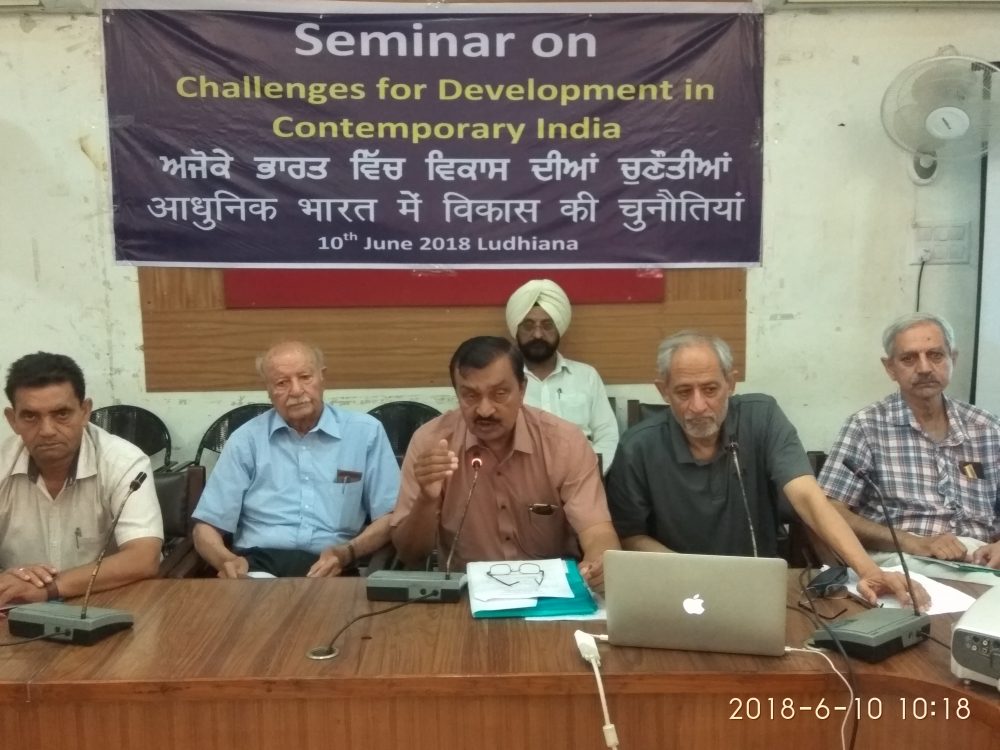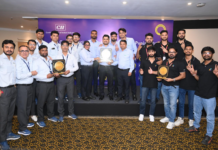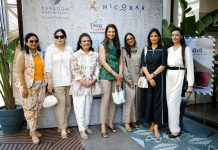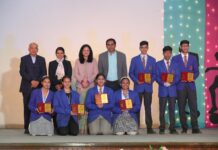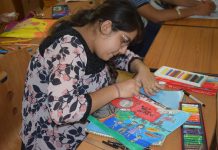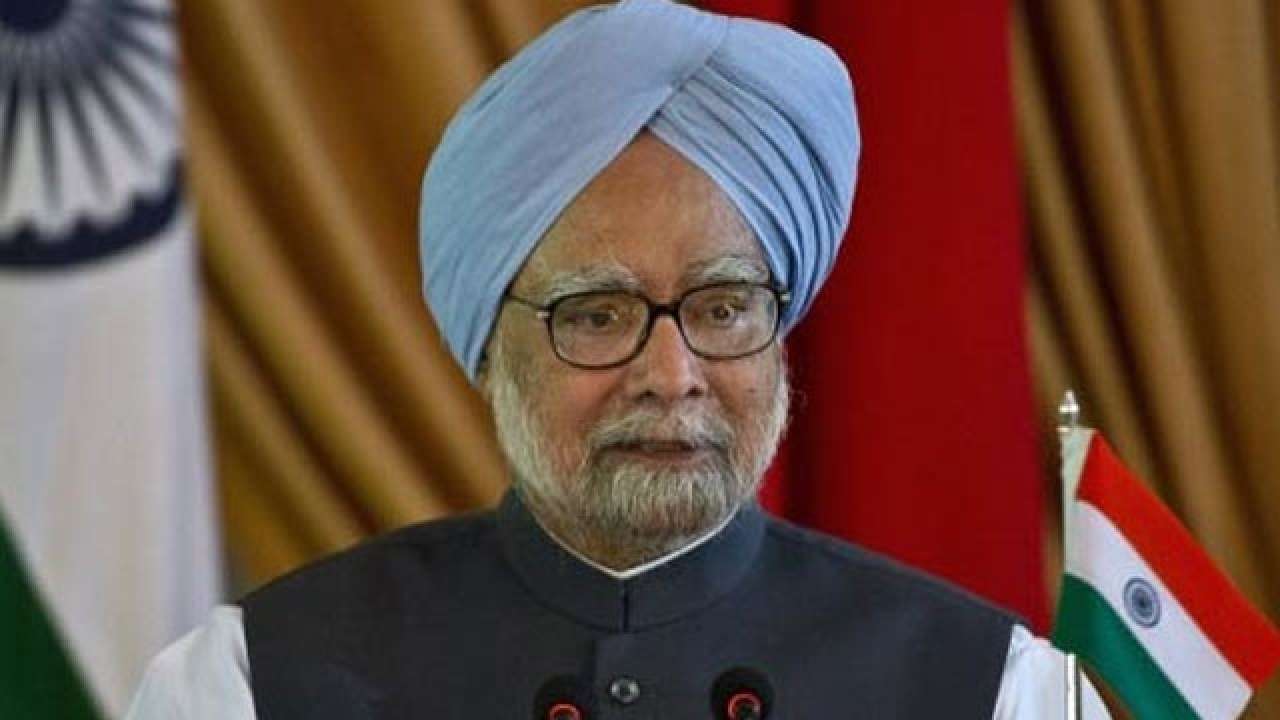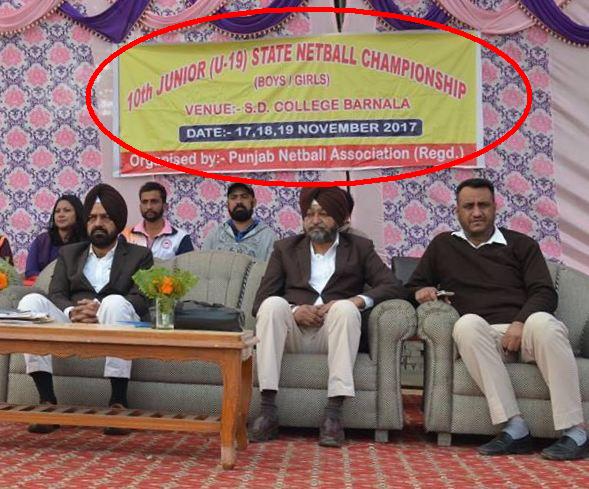JUNE 10 LUDHIANA Social Harmony coupled with people-oriented policies is essential for inclusive growth. A stable and harmonized society is essential for development. We need inclusive developmental policies so that gains of development reach each and every citizen. A very small section of the society has amassed huge wealth under the present model of development while vast majority of the people has been totally marginalized and has been pushed to abject poverty. They are devoid of food, shelter, education and healthcare services. Agriculture is in crisis forcing many farmers to commit suicides. Having failed to full fill people’s needs, those in power are splitting the society on caste and communal lines to divert the attention of the people. These trends have to be fought back. This was the general consensus reached at a seminar organized by the Social Thinkers Forum at Ludhiana today on the theme “Challenges for Development in Contemporary India”. Speaking on the issues related to vulnerable sections, Comrade Sukumar Damle – National Secretary All India Trade Union Congress (ATIUC) said that for the last few years the corporate model of development has taken over the concept of social welfare state. As a result the already deprived sections are being further marginalized; the workers right to form union is being diluted. With contractualisation of jobs, the workers are losing job security and service benefits. The new wage code bill 2017 will totally undo the rights secured by the workers after long drawn struggles. Dwelling on the issue of education, veteran teacher leader Charan Singh Sarabha said that there is now a huge gap in the standard of education among the schools. As a result many children do not get to know that vast majority of the people of our country live in abject poverty. History is being distorted and communalized. This will weaken the social fabric and have long-term impact on the socio-economic structure of our country. Prof. Tarsem Bahia an educationist said that obscurantism is being spread through education. This will distort the scientific outlook which the children must develop. Dr Tejbir Singh –Former Principal Govt. Medical College Amritsar and Vice President Indian Doctors for Peace and Development (IDPD) cautioned about healthcare getting out of reach of the common man. Every year 6.3 crore people are pushed below poverty line as a result of out of pocket expenditure on health. Government is further reducing already very low public health spending on health. They are out to introduce insurance-based healthcare system thus giving huge sums to the insurance companies. Renowned economist Dr R S Ghuman said that in the absence of government incentives the agriculture is no more a profitable field. Crisis is so deep that lakhs of farmers have committed suicides in the last few years. The government has totally backed out of its promise to implement Swaminathan Commission report. A renowned social activist and film producer Satnam Singh Channa said that it is most unfortunate that conspiracies are being hatched to split the society on cast and communal lines. This is against the basic values of our society which has always assimilated various cultures and strengthened itself. India is multi cultural, multi linguistic society. To force mono culture on our society is against the tenets of constitution of our country. The efforts of those in power now to split the society on caste and communal lines cannot sustain for long because India has emerged a plural and society with unity in diversity; but to defeat these nefarious deigns consistent ideological struggle has to be waged. Dr Arun Mitra – Convener of the forum said that the issues discussed need to be taken to the ground level. Co Convener M S Bhatia said that a plan of action for this will be charted out. Those who participated in the discussion include D P Maur, Dr Rajidnerpal Singh Aulukh, Dr Gurpreet Singh Rattan, Dr Inderveer Singh, Ramesh Rattan, Raghbir Singh, Jagdish Chander, Naresh Gaur, Avtar CHibberr, Vijay Kumar, Dr Gurvinder Singh, Prof. Kuldeep Singh, Inderjit Singh Sodhi, Ranjit Singh, Dr Gurcharan Kocher, Dr Jasvinder Singh. BUREAU REPORT CNI
JUNE 10 LUDHIANA Social Harmony coupled with people-oriented policies is essential for inclusive growth. A stable and harmonized society is essential for development. We need inclusive developmental policies so that gains of development reach each and every citizen. A very small section of the society has amassed huge wealth under the present model of development while vast majority of the people has been totally marginalized and has been pushed to abject poverty. They are devoid of food, shelter, education and healthcare services. Agriculture is in crisis forcing many farmers to commit suicides. Having failed to full fill people’s needs, those in power are splitting the society on caste and communal lines to divert the attention of the people. These trends have to be fought back. This was the general consensus reached at a seminar organized by the Social Thinkers Forum at Ludhiana today on the theme “Challenges for Development in Contemporary India”. Speaking on the issues related to vulnerable sections, Comrade Sukumar Damle – National Secretary All India Trade Union Congress (ATIUC) said that for the last few years the corporate model of development has taken over the concept of social welfare state. As a result the already deprived sections are being further marginalized; the workers right to form union is being diluted. With contractualisation of jobs, the workers are losing job security and service benefits. The new wage code bill 2017 will totally undo the rights secured by the workers after long drawn struggles. Dwelling on the issue of education, veteran teacher leader Charan Singh Sarabha said that there is now a huge gap in the standard of education among the schools. As a result many children do not get to know that vast majority of the people of our country live in abject poverty. History is being distorted and communalized. This will weaken the social fabric and have long-term impact on the socio-economic structure of our country. Prof. Tarsem Bahia an educationist said that obscurantism is being spread through education. This will distort the scientific outlook which the children must develop. Dr Tejbir Singh –Former Principal Govt. Medical College Amritsar and Vice President Indian Doctors for Peace and Development (IDPD) cautioned about healthcare getting out of reach of the common man. Every year 6.3 crore people are pushed below poverty line as a result of out of pocket expenditure on health. Government is further reducing already very low public health spending on health. They are out to introduce insurance-based healthcare system thus giving huge sums to the insurance companies. Renowned economist Dr R S Ghuman said that in the absence of government incentives the agriculture is no more a profitable field. Crisis is so deep that lakhs of farmers have committed suicides in the last few years. The government has totally backed out of its promise to implement Swaminathan Commission report. A renowned social activist and film producer Satnam Singh Channa said that it is most unfortunate that conspiracies are being hatched to split the society on cast and communal lines. This is against the basic values of our society which has always assimilated various cultures and strengthened itself. India is multi cultural, multi linguistic society. To force mono culture on our society is against the tenets of constitution of our country. The efforts of those in power now to split the society on caste and communal lines cannot sustain for long because India has emerged a plural and society with unity in diversity; but to defeat these nefarious deigns consistent ideological struggle has to be waged. Dr Arun Mitra – Convener of the forum said that the issues discussed need to be taken to the ground level. Co Convener M S Bhatia said that a plan of action for this will be charted out. Those who participated in the discussion include D P Maur, Dr Rajidnerpal Singh Aulukh, Dr Gurpreet Singh Rattan, Dr Inderveer Singh, Ramesh Rattan, Raghbir Singh, Jagdish Chander, Naresh Gaur, Avtar CHibberr, Vijay Kumar, Dr Gurvinder Singh, Prof. Kuldeep Singh, Inderjit Singh Sodhi, Ranjit Singh, Dr Gurcharan Kocher, Dr Jasvinder Singh. BUREAU REPORT CNI




